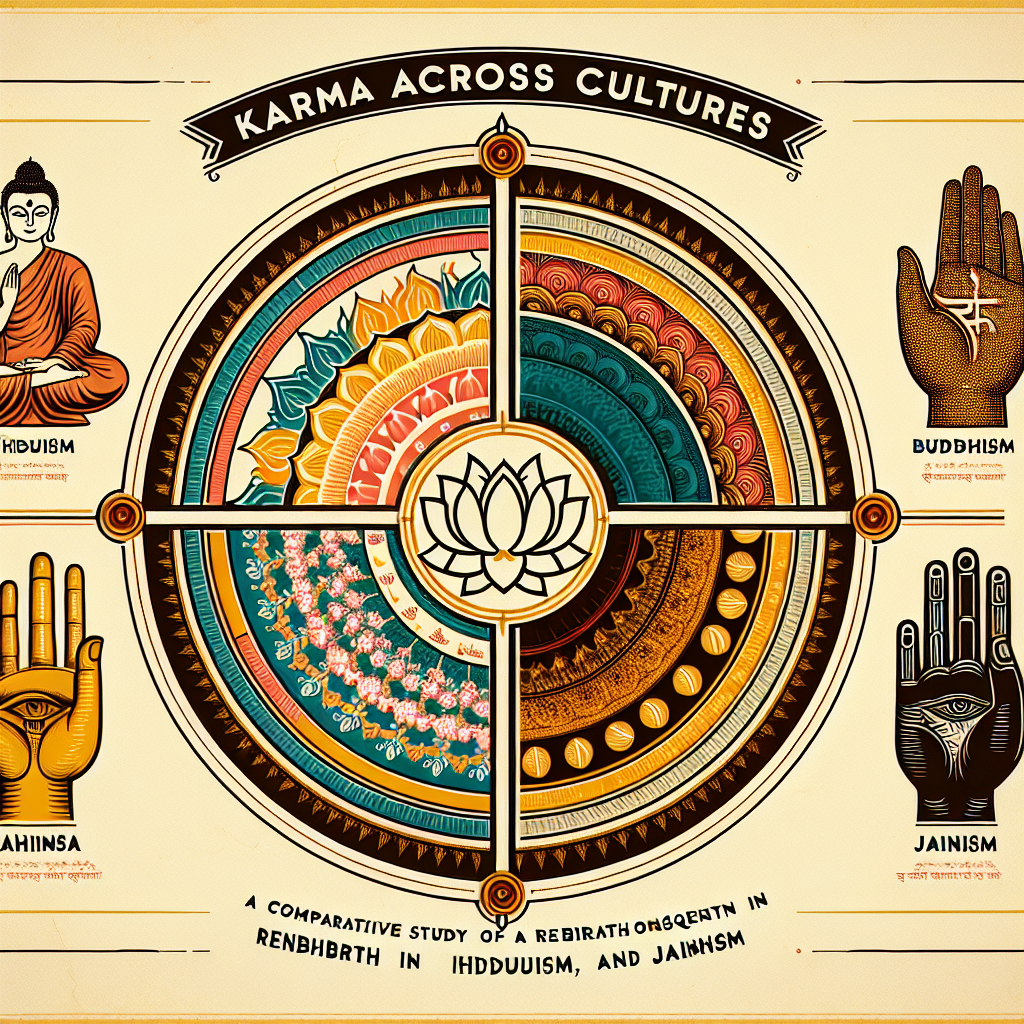Karma, a term that resonates through the corridors of time and across cultures, refers to the law of moral causation: the idea that actions have consequences, which shape the future. This fundamental principle transcends mere abstract philosophy; it is a lived reality for millions across the world, particularly in the religions of Hinduism, Buddhism, and Jainism. Despite their shared geographical and metaphysical origins, each of these traditions uniquely interprets the concepts of karma, rebirth, and consequence. Through this comparative study, we will explore the nuanced understandings of karma within these religions, and how they shape their followers’ ethical frameworks and spiritual aspirations.
Hinduism: The Cosmic Law of Action and Consequence
In Hinduism, karma is an intrinsic aspect of a person’s dharma—its ethical duties and responsibilities. The term "karma" literally means "action" or "deed," encompassing all thoughts, words, and deeds, as every action contributes to one’s future circumstances.
The concept of rebirth, or samsara, is central to Hindu belief. It posits that the soul (atman) is immortal, and through a continuous cycle of birth, death, and rebirth, the atman evolves towards moksha—liberation from the cycle of samsara. This liberation is achieved through self-realization, good deeds, and the pursuit of knowledge.
The consequences of one’s actions—good or bad—weigh heavily on the soul’s journey. Good karma (punya) accumulates through virtuous deeds and adherence to dharma, leading to favorable rebirths. Conversely, bad karma (papa) results from immoral actions, leading to unfavorable circumstances in future existences.
Rituals, prayers, and acts of devotion are essential in Hinduism, believed to mitigate negative karma and enhance positive outcomes. The divine grace of deities, particularly through rituals and pujas, is seen as vital in the process of karma and rebirth.
Buddhism: The Interdependence of Actions and Birth
Buddhism, while sharing roots with Hindu philosophy, presents a distinct understanding of karma. Here, karma is viewed as a process of intentional actions that shape one’s experiences and future existences. The concept is closely tied to the notion of mindfulness and the ethical implications of one’s choices.
In Buddhism, rebirth occurs as a result of karma, but it is not the personal atman that reincarnates. Instead, the process is understood through the concept of "anatta," or non-self. The continuity of existence is described as a series of aggregates (skandhas) that come together due to past actions. When one dies, the imprints of past actions influence the emerging individuality in the next life, creating a cycle known as samsara—similar to Hinduism but devoid of a permanent soul.
Each action—positive or negative—contributes to one’s karmic legacy, affecting future rebirths. Good deeds lead to states of happiness, while bad deeds result in suffering. This is articulated through the Four Noble Truths and the Eightfold Path, emphasizing ethical conduct, mental discipline, and wisdom, guiding practitioners towards enlightenment (nirvana) and the cessation of suffering.
Buddhism encourages followers to cultivate awareness and compassion, leading to more mindful actions that foster positive karma. The understanding of karma in Buddhism extends beyond mere actions to include intentions behind actions, where the latter holds significant weight in determining outcomes.
Jainism: The Rigorous Ethical Framework of Karma
Jainism offers an even more detailed and rigorous framework regarding karma, distinguishing itself through its detailed metaphysics and ethical systems. In Jain belief, karma exists as a form of subtle matter that attaches to the soul (jiva) based on its actions. The ultimate aim is to free the soul from these karmic particles, allowing it to achieve liberation (moksha).
Jains categorize karma into various types and effects based on actions, intentions, and the impact on living beings. Unlike Hindu and Buddhist views, which often view karma as energy affecting future lives, Jains perceive karma as a type of "sticky" substance that binds to the jiva, resulting in various karmic consequences.
Rebirth in Jainism is seen as a process influenced by accumulated karma from past lives. Every action—whether good or bad—affects the soul’s journey towards liberation. Jains adhere strictly to ethical conduct, known as ahimsa (non-violence), recognizing that every living being possesses a jiva (soul) deserving of compassion and respect. Their rigorous adherence to non-violence impacts daily actions, dietary choices, and even environmental considerations.
Through spiritual practices, including meditation and rituals, Jains strive to shed karmic entanglements. The ultimate goal is to achieve a state of perfect knowledge and liberation, thereby escaping the cycle of rebirth altogether.
Comparative Insights
The interrelation of karma, rebirth, and ethical conduct across Hinduism, Buddhism, and Jainism showcases both collective themes and distinctive variances.
Nature of Karma: While all three traditions recognize karma as a mechanism influencing rebirth and consequence, Hinduism emphasizes the notion of atman and divine grace, Buddhism focuses on intention and the concept of anatta, and Jainism presents a detailed metaphysical framework regarding the physical essence of karma.
Rebirth: In Hinduism and Buddhism, there is a focus on the cyclical nature of life, while Jainism views this cycle as one that binds the soul in a physical sense due to karmic attachments.
- Moral Education: All three traditions use karma to educate followers about ethical living and personal responsibility. However, the method of spiritual growth—through devotion, mindfulness, or strict ethical adherence—varies significantly.
FAQs
Q1: Is karma a deterministic concept?
A1: While karma suggests that actions have consequences, it is not entirely deterministic. Each individual’s choices and intentions also play a critical role in shaping their experiences and future.
Q2: Can karma be changed?
A2: Yes, individuals can alter their karmic outcomes through current actions—by engaging in positive deeds and sincere intentions, one can mitigate the effects of past actions.
Q3: Do all three religions believe in rebirth?
A3: Yes, all three religions hold the belief in rebirth. However, the interpretations and mechanisms of this rebirth differ across traditions.
Q4: How do these beliefs impact daily life?
A4: Followers of these religions often lead ethical lives, making conscious choices in their actions and interactions with others, influenced by their understanding of karma.
Q5: Are there rituals to improve karma in these religions?
A5: Yes, all three religions have various rituals, prayers, and practices designed to improve one’s karma and facilitate a more favorable rebirth.
In conclusion, the study of karma across Hinduism, Buddhism, and Jainism reveals a fascinating tapestry of spiritual thought, where action and consequence intertwine uniquely yet universally. By fostering a deeper understanding of these principles, individuals can navigate their moral compass more effectively, contributing to a harmonious existence within their communities and the cosmos at large.
It seems like you may want me to generate a prompt for you, but it’s unclear what topic or context you’re interested in. Could you please provide more details or specify the subject matter? This way, I can create a more tailored prompt for you!, #Karma #Cultures #Comparative #Study #Rebirth #Consequence #Hinduism #Buddhism #Jainism, #Karma #Cultures #Comparative #Study #Rebirth #Consequence #Hinduism #Buddhism #Jainism, 1736580170, karma-across-cultures-a-comparative-study-of-rebirth-and-consequence-in-hinduism-buddhism-and-jainism





